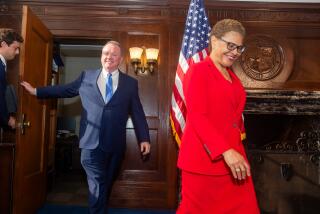What a Difference 37 Years Can Make
To Latino residents of the Oakview neighborhood, Huntington Beach Police Lt. Luis Ochoa seemed to be everywhere.
He met regularly with the residents. He got the soccer league on its feet. He read his favorite children’s literature during story time at the library.
Now, Huntington Beach’s first Mexican American police officer is retiring after 37 years. He leaves behind an Oakview that is no longer a battleground for gangs nor a magnet for drug buyers from as far away as Los Angeles, police and residents say.
Oakview, which comprises about 12 city blocks of aging apartments bordered by Beach Boulevard, Slater Avenue, Nichols Street and Warner Avenue, still has its problems. But residents say they are more confident, in part because of the lessons Ochoa taught them.
“He’s like a member of our family,” said Martha Cervantes, who has lived in Oakview for 16 years and who said she watched the neighborhood become a place where families could live in safety.
Ochoa, who was honored at a community luncheon Wednesday along with retiring Lt. Clyde Stuart, was one of the few Latino role models in Huntington Beach when he began his job, many city residents said. And while there are other Latinos in the school district and other community agencies these days, they are still few, say residents. The Police Department has only 12 Spanish-speaking officers among the 230 in the department.
“You get a lot of satisfaction from working in a place like Oakview,” said Ochoa, a 60-year-old father of two and grandfather of three. “People really appreciate what we do. And I made sure to bring officers in that neighborhood who would be comfortable in that neighborhood.”
On streets where brigades of baby strollers outnumber cars at midday, families are learning how to deal with local government and how to improve relationships in their homes, said Lillian Chacon, a counselor at the Oakview Family Resource Center, which helps the families of at-risk students.
Millions of dollars were pumped into the neighborhood for street improvements, additional police and code enforcement campaigns, said Police Lt. Chuck Thomas, who thanked Ochoa for some of them.
When Ochoa became police area commander for north Huntington Beach in 1993, he said Oakview became a pet project, in part because he felt at home. It reminded him of where he grew up in west Wilmington, near the Los Angeles Harbor.
He persuaded his department to open a substation at Beach Boulevard and Slater Avenue in 1996. By 1998, crime had gone down, and the substation had become a local haunt for a newly formed band of police volunteers and, on Halloween, for 5,000 children who enjoyed a haunted house set up there.
Ochoa also persuaded the city to open a day laborer center where immigrants could seek work in construction and gardening instead of standing on street corners. After nearly five years of planning, the center opened in 1999.
Some residents remained suspicious of police and officials, who tried to regulate code violations such as overcrowding, as well as trucks that sell groceries to a community that relies heavily on public transportation.
Then on May 5, a police officer shot and killed an 18-year-old who pointed what turned out to be a toy gun. Rafael Torres, a member of newly formed United Neighbors, said the anger that roiled in the community resulted in increased activism and more contact with police.
Ochoa participated in a series of meetings conducted to cool tensions after the shooting. They appear to have had mixed results.
“They had those meetings and I remember [Ochoa], but I still have my doubts. I still feel like the police are not always on our side,” said Oakview resident Luis Martinez, 31, who lives with his mother, sister and son in a two-bedroom apartment. “What they did will take years to overcome.”
Even so, some residents have mended fences. Speaking at the luncheon, Rafael Torres addressed Ochoa: “How many children have been saved from domestic violence? How many parents have learned from you, learned about the law?”
Felipe Zapata said he met Ochoa in the late 1980s, when, as a young man recently arrived from Mexico, he was arrested for repeatedly throwing stones at pigeons at a local beach. Ochoa was sent to translate the conversation between Zapata and the arresting officer. The arrest turned out to be the beginning of a long friendship.
Zapata, now the president of the Huntington Beach Soccer League, has since turned to Ochoa for help in getting drug dealers off the soccer fields and for help in building a bathroom near the fields.
“It really hurts that he’s retiring. It is something he has to do,” said Zapata. “He’s made an impact that will help this neighborhood for many years to come.”
More to Read
Sign up for Essential California
The most important California stories and recommendations in your inbox every morning.
You may occasionally receive promotional content from the Los Angeles Times.










